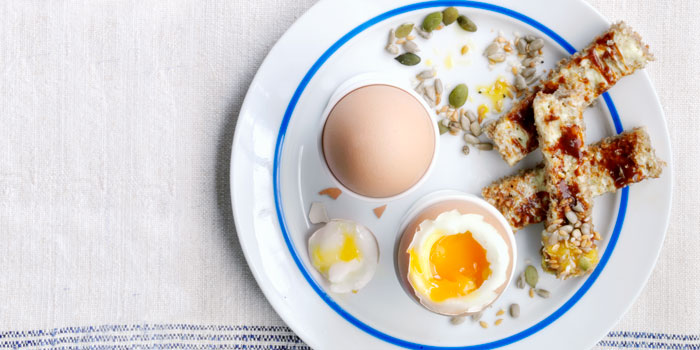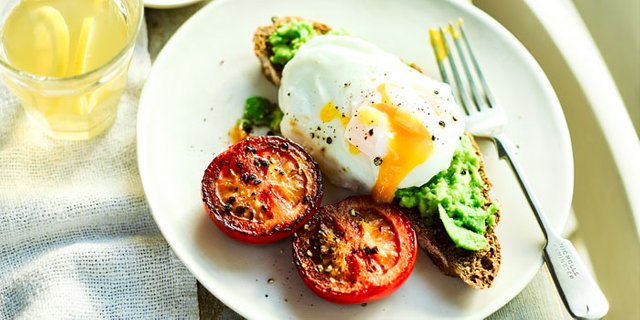The health benefits of eggs
The humble egg has impressive health credentials. Nutritionist Jo Lewin shares recipes, nutritional highlights and tips on choosing a good egg.
An introduction to eggs...

Both the white and yolk of an egg are rich in nutrients - proteins, vitamins and minerals with the yolk also containing cholesterol, fat soluble vitamins and essential fatty acids. Eggs are an important and versatile ingredient for cooking, as their particular chemical make up is literally the glue of many important baking reactions.
Since the domestication of the chicken, people have been enjoying and nourishing themselves with eggs. As a long time symbol of fertility and rebirth, the egg has taken its place in religious as well as culinary history. In Christianity, the symbol of the decorated egg has become synonymous with Easter. There are lots of different types of egg available, the most commonly raised are chicken eggs while more gourmet choices include duck, goose and quail eggs.
Nutritional highlights
Eggs are a very good source of inexpensive, high quality protein. More than half the protein of an egg is found in the egg white along with vitamin B2 and lower amounts of fat and cholesterol than the yolk. The whites are rich sources of selenium, vitamin D, B6, B12 and minerals such as zinc, iron and copper. Egg yolks contain more calories and fat. They are the source of cholesterol, fat soluble vitamins A, D, E and K and lecithin - the compound that enables emulsification in recipes such as hollandaise or mayonnaise.
Some brands of egg now contain omega-3 fatty acids, depending on what the chickens have been fed (always check the box). Eggs are regarded a 'complete' source of protein as they contain all nine essential amino acids; the ones we cannot synthesise in our bodies and must obtain from our diet.
Did you know...

A study published in Paediatrics magazine has suggested that giving young children just one egg a day for six months, alongside a diet with reduced sugar-sweetened foods, may help them achieve a healthy height and prevent stunting.
A poached egg on a piece of toast topped with avocado with tomatoes on the side
The cholesterol question
For years eggs have been considered more of a health risk than a healthy food. This is because they were considered a high cholesterol food, so those with high cholesterol levels were advised to avoid them. We now know that the cholesterol found in food has much less of an effect on our blood cholesterol than the amount of saturated fat we eat. If you’ve been advised by your GP to change your diet in an attempt to reduce your blood cholesterol levels, the best thing to do is to keep to daily guideline intakes for saturated fat (20g for the average woman and 30g for the average man) opting instead for mono-unsaturated fats found in olive and rapeseed oils. It's also a good idea to increase your intake of fruit, vegetables and fibre whilst minimising sugars and refined carbs.
If you are concerned about your cholesterol or are unsure whether it is safe for you to consume eggs please consult your GP.
Eggs for health
Eggs are rich in several nutrients that promote heart health such as betaine and choline. During pregnancy and breast feeding, an adequate supply of choline is particularly important, since choline is essential for normal brain development. In traditional Chinese medicine, eggs are recommended to strengthen the blood and increase energy by enhancing digestive and kidney function.
Eggs are a useful source of Vitamin D which helps to protect bones, preventing osteoporosis and rickets. Shop wisely because the method of production – free range, organic or indoor raised can make a difference to vitamin D content. Eggs should be included as part of a varied and balanced diet. They are filling and when enjoyed for breakfast may help with weight management, as they high protein content helps us to feel fuller for longer.
Quail eggs...
Quail eggs have a similar flavour to chicken eggs, but their petite size (five quail eggs are usually equal to one large chicken egg) and pretty, speckled shell have made them popular in gourmet cooking. The shells range in colour from dark brown to blue or white. Quail eggs are often hard-boiled and served with sea salt.
Duck eggs...
Duck eggs look like chicken eggs but are larger. As with chicken eggs, they are sold in sizes ranging from small to large. Duck eggs have more protein and are richer than chicken eggs, but they also have a higher fat content and more cholesterol. When boiled, the white turns bluish and the yolk turns red-orange.
A basil omelette in a pan topped with mushrooms
How to select and store
Choose eggs from free-range or organically raised chickens. Eggs should always be visually inspected before buying. It is best to check for cracks or liquid in the box to ensure there are no broken ones. Eggs are best stored in the refrigerator where they may remain for up to one month (check the best-before-date on the box). Eggs with higher omega-3 fatty acid content are best eaten as early as possible to keep these oils fresh.
Safety
The main safety concern used to be salmonella food poisoning, but the Food Standards Agency (FSA) have recently changed their guidelines on eating runny eggs. They now say that infants, children, pregnant women and elderly people can safely eat raw or lightly cooked eggs that are produced under the British Lion Code of Practice. Visit the FSA website for more information.
Another safety concern regarding eggs is that they are a common food allergen, particularly among young children. See your GP if you have any concerns regarding allergies to eggs.
Enjoyed this? Now read...
Our favourite healthy egg recipes
All our health benefits guides
Am I getting enough vitamin D?
How to eat a balanced diet
I just finished a great book (in Dutch, not translated, by Daan de Wit) on so many important health topics. Such as how we've been warned against eating fatty foods or cholesterol, and how research actually shows that we grow fat from fatty foods as much as we turn green from eating greens. I was so happy to find sources that present reliable information on these topics, that have so much relevance for our health but where everybody just repeats old and unreliable information... So thanks for your post and sharing some correct food and nutrition info!
Congratulations @bigthinker! You have completed some achievement on Steemit and have been rewarded with new badge(s) :
Click on any badge to view your own Board of Honor on SteemitBoard.
For more information about SteemitBoard, click here
If you no longer want to receive notifications, reply to this comment with the word
STOP